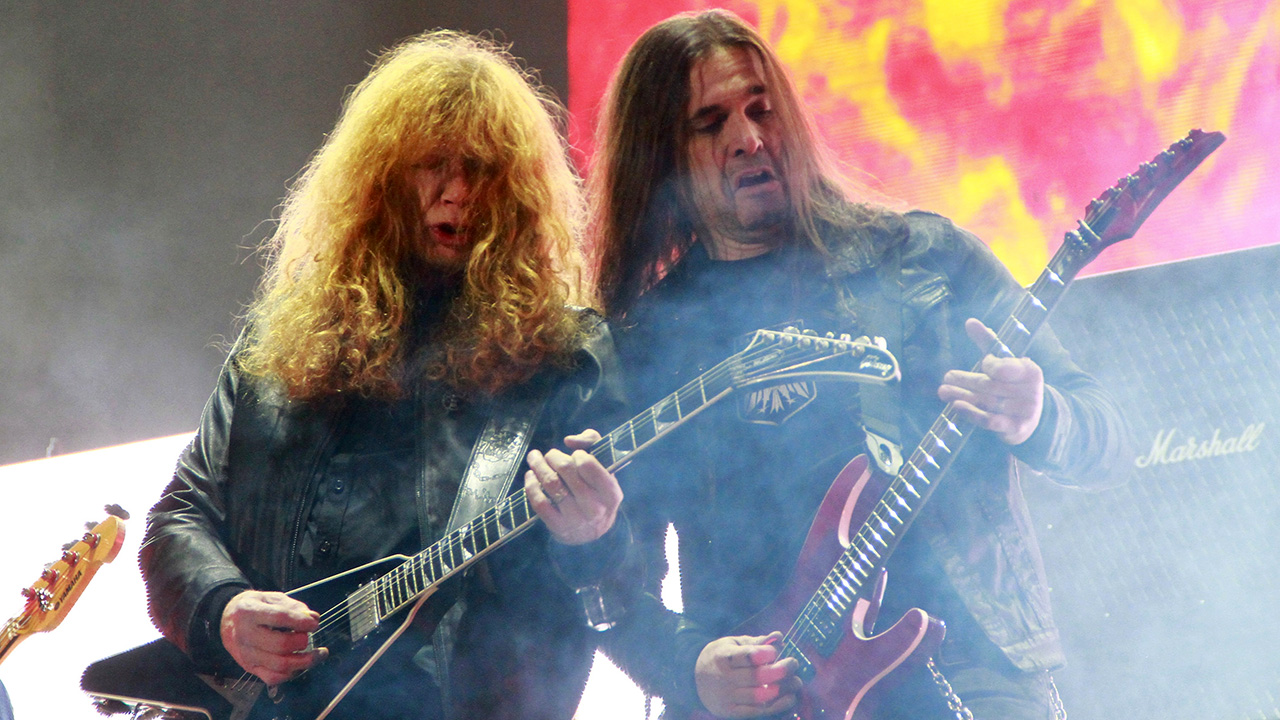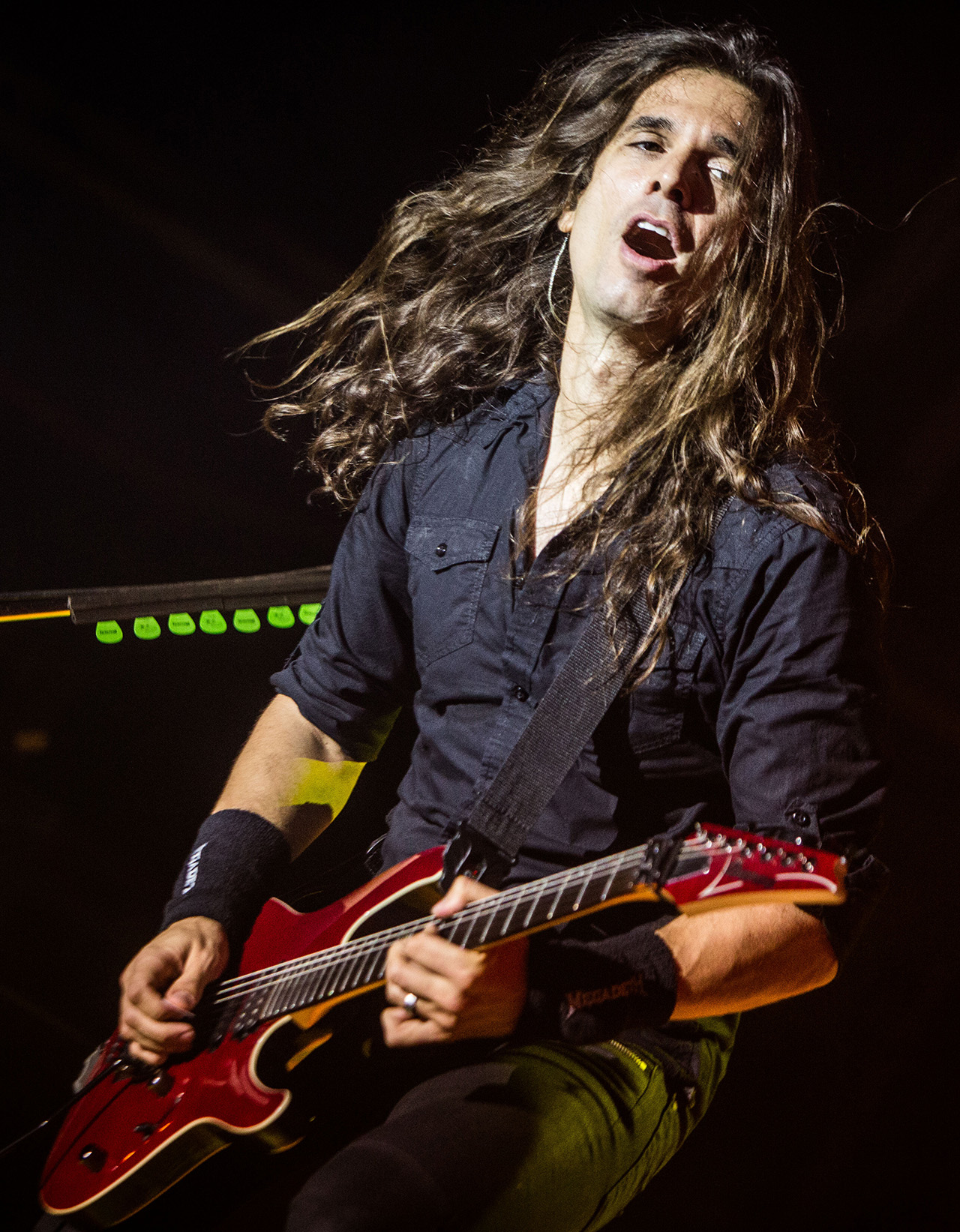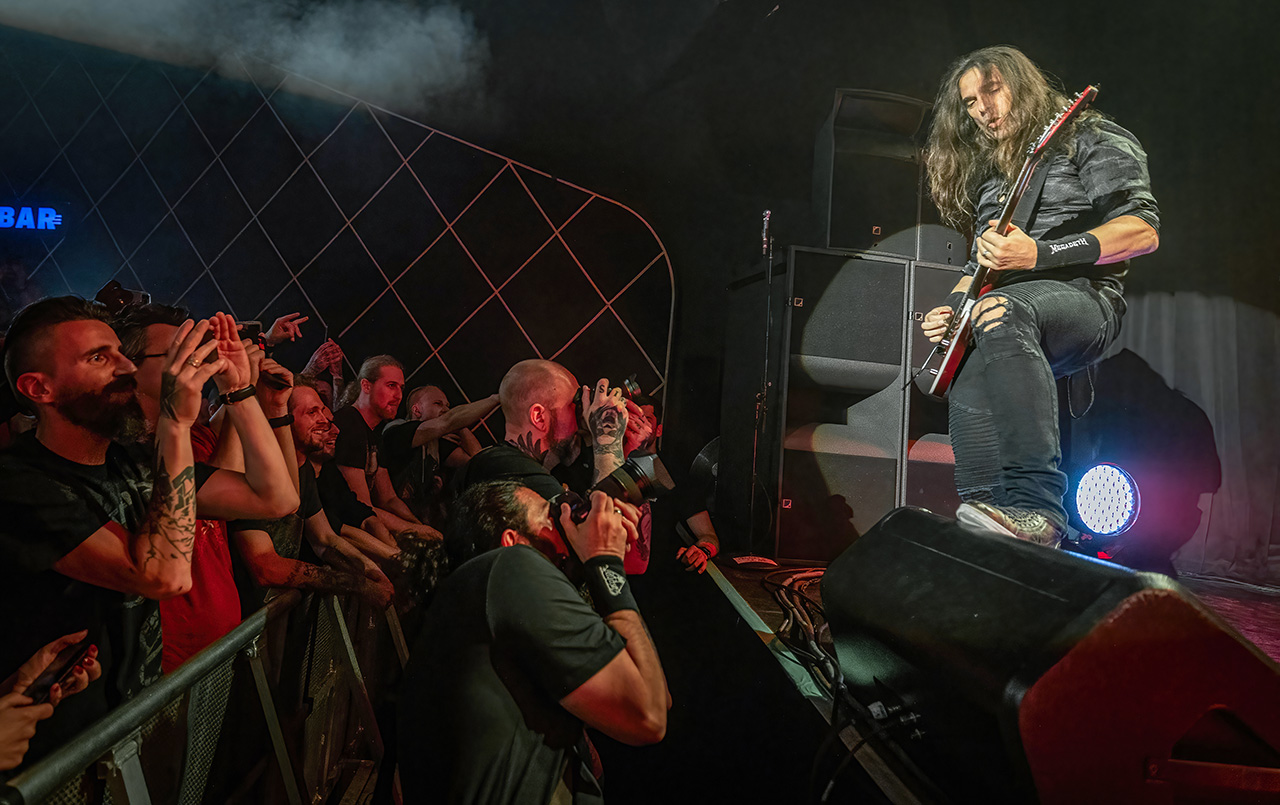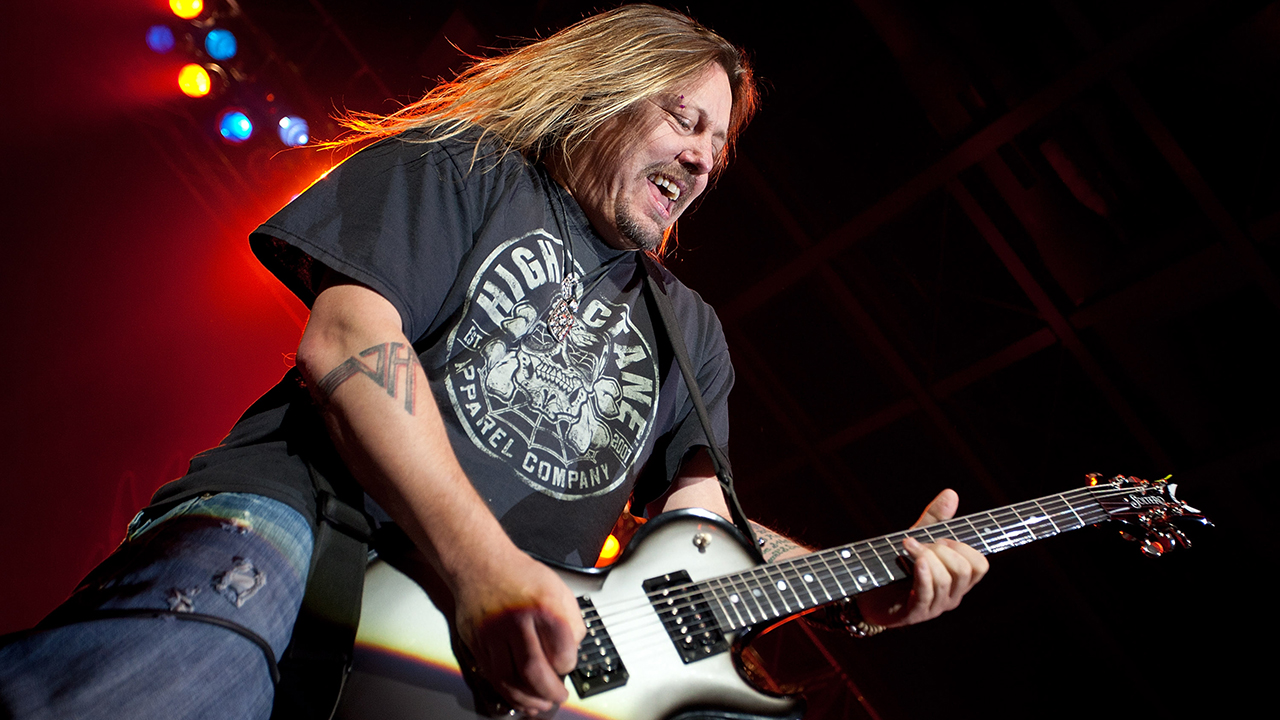“I had two viable options: to be in Megadeth or not. I chose my personal life. No regrets”: Kiko Loureiro opens up on what he meant by “freedom,” how he trained up his replacement, and why he suggested Marty Friedman should return
The former Angra guitarist reveals his current relationship with Dave Mustaine after his temporary departure became permanent, and where he wants to take his guitar playing next

All the latest guitar news, interviews, lessons, reviews, deals and more, direct to your inbox!
You are now subscribed
Your newsletter sign-up was successful
When Kiko Loureiro joined Megadeth on April 2, 2015, he knew he’d experience a windfall of fame, fortune, and emotions. It must have been difficult to leave Angra, the band he’d co-founded in 1991. But it must have been even more difficult assuming the role of lead guitarist in Dave Mustaine’s band Megadeth – a hotbed of activity since Marty Friedman split the scene in 1999.
After Friedman, there was Al Pitrelli, Glen Drover and Chris Broderick. None of them stuck; in fact, most of them flamed out in infamy. And so, by 2015, many assumed Mustaine to be impossible to work with and that Megadeth was on its last legs.
Truthfully, that was the case – until Loureiro came along. In short order, much like Friedman had before him, he helped right the ship with two critically acclaimed records in Dystopia (2015) and The Sick, The Dying… And The Dead! (2022).
Now in reflection mode after stepping away from the MegaMachine in the fall of 2023, Loureiro tells Guitar World, “I’m so proud of what we did. Dystopia was a Grammy winner, and The Sick, The Dying… And The Dead! was nominated.”
“I wrote several songs with Dave, played amazing places, did huge tours, and I still have a great relationship with the guys. I can look back and be proud of what I did with Megadeth, and I will one day be proud to catch up with them, wearing a Megadeth shirt!”
Unlike many who have departed the band in the past, Loureiro seems to be a rare case of an amicable divorce. It helped that he left the band in good shape by suggesting his replacement, Teemu Mäntysaari. “It’s all positive vibes, man,” Loureiro says. “I’ve been in situations in the past where it wasn’t, and I’ve learned that when you dedicate your life to creating music with someone else, you don’t want bad feelings.”
“I don’t want weird feelings connected to music. When you’ve make music with someone, you don’t want to disconnect over stupid fights. So while I didn’t want to be in Megadeth anymore, I’m still proud. And I’m glad about that – as everyone knows that it hasn’t always been that way when it comes to Megadeth.”
All the latest guitar news, interviews, lessons, reviews, deals and more, direct to your inbox!
I can look back and be proud of what I did with Megadeth, and I will one day be proud to catch up with them, wearing a Megadeth shirt!
Now in possession of his freedom – which means something different than most think – Loureiro adds: “Everybody knows that Megadeth is a place where musicians come and go. It’s not surprising to anybody that I’d eventually go.
“People were probably saying, ‘Oh, if he stays, he’ll be there longer than Marty,’ or whatever math people like to do. No matter what, people would [eventually] say, ‘Kiko is past his due date.’ Some bands are more stable, and others keep changing members. It’s whatever works, you know?
“It’s rare that any band stays together forever like U2 or Rush. So nine years was okay, and I did well. It could have been more – but I needed to be out for personal reasons. I had the freedom to choose if I wanted to stay or go. I made my choice. No regrets.”
You left Megadeth at the end of 2023. What brought you to that decision?
“It started when I booked a trip home to Brazil. The last time I’d been was in 2019, before the pandemic; I got to a point where I said, ‘I need to visit my family,’ so I booked a trip for the Thanksgiving period in 2023 because Megadeth never does anything around that time.
“When you’re young, not married and have no kids, the mindset is, ‘The more concerts, the better.’ But my daughter is 12 now, and I want to spend time with her. I also want to be out there playing. When the Megadeth thing happened for me in 2015, I had a young daughter and twins who were newborns. I was always struggling with knowing I needed to be touring, but also wanted to be home with my kids and my wife.
“So the feeling of, ‘Should I be out doing this rockstar thing while my kids are at home?’ kept coming up. And the more moments and important dates I missed, the harder it was.
The feeling of, ‘Should I be out doing this rockstar thing while my kids are at home?’ kept coming up
“It got harder in 2023, especially during the three-month summer tour. So I went to Dave in June, saying, ‘This is too much. I’m not feeling like I’m in the right place or mood to give 100 percent.’
“It was complicated for me to say because I wanted to play, but I knew I needed to be at home. And, of course, Dave was not expecting it. We had just done a show in Florida with the Misfits, and it was right after that show that I talked to Dave.
“And then Megadeth management was there, and I let them know I could not do the September gigs. I offered to help find a replacement and do what was needed to help Megadeth be ready to go.”
What led to your departure being a permanent situation rather than just a temporary thing?
“My proposal was not to do the September shows and help them find a replacement, which turned out to be Teemu. But then I had some situations with my kids and had to go to the doctor, and I felt like I wanted to be home.
“And I get it – Megadeth must go on, right? Being able to pick and choose where and when I play is not going to be a thing. I mean, I guess it could be, but that’s not the way it turned out.
“Maybe they felt like, ‘Well, Kiko might come out on the next tour and say the same thing,’ which I understand. So I told them, ‘I understand if you guys feel that I’m unreliable,’ They kept asking me, ‘Are you sure?’
“Ultimately, I had to take control because I knew I needed and wanted to be home. People who don’t have kids won’t understand, while if you do, you will.”

The only comment you’ve made until now came during an appearance on the Amplifica podcast, where you mentioned “freedom”. What does freedom look like for you now?
“It was a friend’s podcast. He didn’t want to ask anything about Megadeth, but I felt like I needed to talk about everything. So I mentioned this ‘freedom’ thing, and I have no idea how the internet interpreted it because I barely go on there. I’m sure people took it differently.
“It came about through a long conversation about my feelings about my life – it wasn’t about wanting to be free from Megadeth in a bad way. I know that many people aren’t able to quit their jobs and choose to be unemployed, but I had two viable options: to be in Megadeth or not. I chose my personal life.”
Did the idea of going from being in Megadeth to unemployment scare you?
“No. I was playing a lot with Megadeth, and I could have kept doing tours, you know? But if I did that, I felt my home life would be worse. And look, everyone survives in this scenario. I had the option of not being in Megadeth – even if you never know the future – and I chose that option so I could be home.
The type of freedom I was talking about was deciding what you want to do with your life. Not specifically freedom from Megadeth
“I don’t want to regret my choices about my kids in 10 years because I wasn’t there. The type of freedom I was talking about was deciding what you want to do with your life. Not specifically freedom from Megadeth.
“I totally understand that having the freedom to decide like this is a luxury. It’s not like in the past, when I had to worry about my next meal or bill; I could decide. It took courage to decide to be with my kids, but I knew they needed me to do that.”
Considering the chemistry between yourself, Dave, James LoMenzo and Dirk Verbeuren, I assume they understood.
“Dirk has no kids, and James and Dave’s kids are grown, so they can tour endlessly without worrying about raising young kids like I do. And anyone can substitute for you, right? I was already substituting for other guitar players who came before me.
”I’m sure Dave, James and Dirk don’t want to be in a situation where a guy in the band doesn’t want to tour. Megadeth must go on, and while I love touring and playing guitar, being with my kids has become more important.”
What about Teemu led you to pick him as your replacement?
“Dave is the commander, right? So, I told him, ‘You choose the guitarist, and I’ll help them however I can.’ But it wasn’t happening, so I took the first step and made a list of guitarists, and Teemu was on that list. I had heard good things and seen some videos, and the fact that he was in Europe and could easily travel to be part of the European tour helped. I presented this to Dave, and he agreed.”
Did you leave Teemu with any knowledge or access to your Quad Cortex presets?
“We had him watch as many concerts over the summer as possible. He came to my house and I gave him access to everything – my presets and even my guitars. I said, ‘You use Ibanez, too. If you want, you can borrow anything you like.’
“He came out and filmed the shows, and I showed him all the moves to prepare him. Later he came to my hotel room and we went through the whole thing many times. I wanted to have as clean a transition as possible to show that I wasn’t quitting Megadeth on bad terms. I wanted what was best for the band.
“So any guitars, gear, or knowledge I had, I offered it to Teemu. I also offered insight into the dynamics of being in Megadeth, which has its own rules – it’s kind of like a corporation and has its own style. I wanted to give him knowledge, so that I wasn’t just giving Dave a guy for now but a guy for forever.”

Many people assumed – or hoped – that Marty Friedman would rejoin Megadeth. Was that discussed?
“Actually, I even mentioned to management and Dave that I thought bringing Marty back would be amazing. I have no idea if they’re talking about it or talking to him, but I did say that. Beyond that, I don’t want to make anything more complicated.”
Marty is so revered amongst Megadeth fans. Was that difficult for you while you were in the band?
“I always felt so accepted the whole time I was in Megadeth. The fans never said anything bad about me or complained, which was amazing. But I’m a fan, and I always understood that Marty was a part of those iconic albums like Rust in Peace and Countdown to Extinction. I understood that Marty was the guy who helped create that sound and style.
“From the moment I joined, I knew I would never win their hearts over Marty. I just tried to be myself and play as close as possible to the classic sound. It was amazing to play this amazing catalog of classic songs, have the fans praise me, and have me nearly side by side with Marty Friedman.”
Where did you leave Megadeth in terms of new music?
“We had great moments like the Grammys, but they weren’t talking about recording a new album anytime soon. For me, It’s so important to keep recording and making new music – but with Megadeth, you play the same 20 songs and maybe add one or two new ones.
“I understood it, but at the same time, I still think it’s important to be creative. As far as I know, they’re not planning anything new for the next few years.”
It sounds like you are interested in recording new music, though. Do you have anything in the works?
“For sure. Even before I talked to Dave I had around 11 new songs done. By May, I had the drums recorded, and in June I did the rhythm guitars for what’s going to be an instrumental solo guitar album. I now need to finish the solos and melodies, and I finally have time.
“This is the fun part for me – I can be looser as I don’t have to worry about touring. I had to keep postponing recording it, so I’m very excited to get going on it this year.”

How did being a part of Megadeth for nearly a decade change you as an artist?
“I have this good feeling over me that I don’t remember feeling before Megadeth. It’s like, ‘Oh, I can finally say no or yes to anything I want.’ Before Megadeth, I had to agree to everything because while Angra was successful in Japan, we had to work hard for everything.
“When asked, we’d tour Canada, Europe, South America, or wherever else. And I was one of the guys who pushed for that. So it’s an amazing feeling to be 51 and have people ask me to do things and be able to decide if I want to do them or not.
I finally get to be like Joe Satriani or Steve Vai. I love to play in bands, but I never had the time or courage to sit back and be like those guys
“It’s also dangerous because I’m now depending on myself to do stuff – like finishing my solo album. There’s a deadline, but I’m the one putting it out there, and I’m the one who will have to record it and decide about touring.
“I finally get to be like Joe Satriani or Steve Vai. I love to play in bands, but I never had the time or courage to sit back and be like those guys. This is the first time I say, ‘Well, here’s Kiko.’ Not Kiko from Angra or Kiko from Megadeth – just Kiko, and nothing extra after that.”
Now we understand what “freedom” means to you at this point in your life, is instrumental guitar where you see yourself going exclusively?
“That would be the easy path. But who knows? I was talking to Dave the other day – we’re still good friends, so to some degree, the door will stay open. I could play with Megadeth or maybe some other band who calls me and has me saying, ‘Okay, now it’s time.’ I don’t know the future, and it will take time.
“I do know that I want to be home more, and that I love to play guitar. I also love to learn and am excited to have more time to do that. I want to play other instruments and work on composing – but like I said, that all depends on me. If someone else asks me to do something, I’m not looking for that. I am not searching for another band; I want to play guitar.”
So it’s wait and see, then?
“Yeah, let’s see how it goes. I want to be more connected to the internet and the guitar community. I plan to do more YouTube and just be more present by doing interviews and talking to people. I think engaging with the community, my guitar academy, and the internet will be important.
“I can do it from home, on my terms, and in my own time while I finish this album and maybe start another. Let’s see what happens… I’ll probably have a better idea in a few months.”
- Find out more at the Kiko Loureiro Guitar Academy.
Andrew Daly is an iced-coffee-addicted, oddball Telecaster-playing, alfredo pasta-loving journalist from Long Island, NY, who, in addition to being a contributing writer for Guitar World, scribes for Bass Player, Guitar Player, Guitarist, and MusicRadar. Andrew has interviewed favorites like Ace Frehley, Johnny Marr, Vito Bratta, Bruce Kulick, Joe Perry, Brad Whitford, Tom Morello, Rich Robinson, and Paul Stanley, while his all-time favorite (rhythm player), Keith Richards, continues to elude him.






